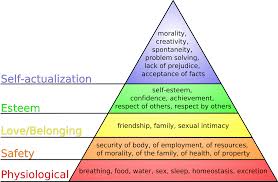Why are we obsessed with having more?
I have seen emotional well-being take a dramatic nosedive over my career, particularly with young people. Life is faster than ever, pressured, overloaded, with constant noise and stimulation which can be overwhelming.
Does it lead to inner happiness?
The obsession with having more and more stuff NOW! Together with the ‘all about me’ attitude, which often starts from a very young age. Does not, in my opinion, lead to inner peace and ‘real’ happiness. The ‘I’ll be happy when…’ mindset is sold to us by consumerism to convince us that we will be happy when we have consumed as much as we can. This belief is then used to ‘self-medicate’ the imbalances and insecurities in our lives. However, sadly this leads to wanting more and STILL not feeling good enough.

Graham Music – Child Psychologist and author of ‘The Good Life: Wellbeing and the new science of altruism, selfishness and immorality’ says;
Research shows that people who care more about status symbols, what they look like or being famous, have more mental health problems, and if you are exposed to those values, you are more likely to become unhappy.
We need to feel safe and loved
As Maslow’s hierarchy of needs shows us, being safe and feeling loved and having positive connections with other people is an essential emotional need for human beings, along with the need to understand and be understood by others.

Kinesiology can help
Kinesiology can help hugely with all these issues. It can help us look at how we can begin to understand ourselves, which is key to making a positive change in our lives. This in turn, then helps us in understanding others and having greater empathy.
Kinesiology uses muscle response testing which allows our body to reveal where imbalances lie. This enables us to discover root causes of emotional behaviours and unwanted habits. Often times if our feelings go unchecked our responses to ourselves and others can come from what is known as the primitive brain, and hot-wired responses such as fear, anger and upset to people or situations that we may now want to change.
Amygdala hijack
Daniel Goldman psychologist and author of Emotional Intelligence: Why it can matter more than IQ states, coined the term ‘Amygdala hijack’
The amygdala is the emotional part of the brain, which regulates the fight or flight response. When threatened, it can respond irrationally. A rush of stress hormones floods the body before the prefrontal lobes (regulating executive function) can mediate this reaction.
Loving and caring for ourselves and others is often not talked about or practised in schools or the workplace or sometimes at home. It can be an opposite experience, where miscommunications, fear, frustrations and anger are being displayed, by teachers, bosses and authoritative figures.
So what can we do about it?
Obtaining balance is about teamwork. Our bodies have and need to work as a team. These teams are our; emotional, chemical, physical and electrical needs. If one area (team) is ‘out of balance’ it will affect them all.
Emotional issues can lead to physical aches and pains, digestive discomfort or even more serious conditions.
Kinesiology uses many unique techniques to balance out unwanted emotions. When we have released these negative responses, we can then help re-build well-being, health and self-esteem. We can begin to understand our mind-body connection and what it needs to move forward in a new way. A new way where we feel balanced and empowered on every level.
We need to look at the whole picture
For well being to become balanced it is important to look at the whole picture and not just part of it, which is exactly what Kinesiology does. There are many different reasons for a lack of emotional well-being and often there are many contributory factors to problems that Kinesiology can unravel. So there is no need to suffer, feel unhappy, powerless or alone with your emotions. There is always something that can be done to enable you to be the change.